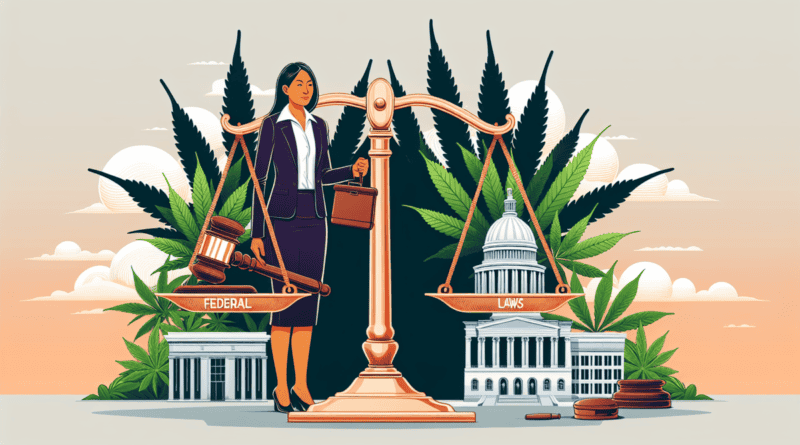Balancing Federal and State Laws in Cannabis HR Management
Introduction
The landscape of cannabis legalization in the United States presents a unique set of challenges and opportunities, particularly for HR managers operating within the cannabis sector. At the federal level, cannabis remains classified as a Schedule I substance under the Controlled Substances Act, which renders it illegal to manufacture, distribute, or possess marijuana. However, as of 2023, numerous states have enacted laws that legalize cannabis for both medical and recreational use. This state-federal dichotomy creates a complex and often contradictory legal environment that HR managers must navigate to ensure compliance and maintain a productive workplace. This article explores the intricacies of this dichotomy and provides strategies for HR managers to effectively handle the challenges associated with it.
Legal Compliance Challenges

Conflict of Laws
The conflicting state and federal laws create a legal gray area that can be difficult for employers to navigate. While state laws may permit cannabis activities, federal prohibition remains a significant barrier. This conflict can lead to legal repercussions for companies that fail to adequately navigate these complexities. Employers must stay informed about both state and federal laws to avoid potential legal issues. For instance, a company operating in a state where cannabis is legal might still face federal prosecution or lose federal contracts if it does not comply with federal laws. Understanding and addressing these conflicts is crucial for maintaining legal compliance and protecting the organization.
HR Policy Development
Developing HR policies that are compliant with both federal and state laws requires a strategic and nuanced approach. Companies must craft policies that respect state legalization while remaining mindful of federal prohibitions. This often involves creating clear guidelines that delineate acceptable behaviors and practices regarding cannabis use. For example, employers might establish policies that allow off-duty cannabis use in accordance with state law but prohibit on-duty use or impairment. Best practices from companies successfully managing this dichotomy include regular policy reviews, legal consultations, and employee training programs to ensure everyone understands the rules and regulations.
Employment Law Complications
Hiring Practices
One of the most significant challenges for HR managers is developing hiring practices that comply with both state legalization and federal prohibition laws. Companies must ensure that potential hires are aware of the legality of cannabis use within state lines while remaining cautious about federal ramifications. This may involve including disclaimers in job postings or conducting thorough interviews to discuss the candidate’s understanding of the company’s policies on cannabis use. Additionally, employers might need to consider background checks and drug testing policies that are fair and legally compliant.
Workplace Drug Policies
Federal agencies and contractors are often required to maintain a drug-free workplace policy, in compliance with the Drug-Free Workplace Act. This requirement impacts how companies balance their drug-testing policies with state laws that allow cannabis use. Employers must navigate this complexity by developing drug-testing policies that are fair, consistent, and legally compliant. For instance, a company might implement a zero-tolerance policy for safety-sensitive positions while allowing more lenient policies for other roles. Ensuring that these policies are clearly communicated to all employees is essential for maintaining compliance and preventing misunderstandings.
Discrimination and Accommodation
Some states have strong protections for medical cannabis patients, prohibiting discrimination based on a patient’s legal use of cannabis. HR managers must ensure that company policies protect employee rights under state law while maintaining compliance with federal regulations. This might involve providing reasonable accommodations for employees who use medical cannabis, such as allowing flexible work schedules or remote work options. Additionally, HR managers should stay informed about changes in state laws and adjust their policies accordingly to ensure that employees’ rights are protected.
Recruitment and Talent Management
Attracting Talent in the Cannabis Industry
Attracting top talent in the cannabis industry can be challenging due to the legal complexities and stigma associated with cannabis use. Companies need to develop strategies to attract and retain employees who are comfortable working in this environment. This might involve marketing the company’s cannabis-friendly policies to potential employees and highlighting the benefits of working in a progressive and innovative industry. Additionally, employers can offer competitive compensation packages, professional development opportunities, and a supportive workplace culture to attract top talent.
Employee Retention
The impact of cannabis policies on employee satisfaction and retention cannot be underestimated. Companies that develop fair and supportive cannabis policies are more likely to retain employees who use cannabis legally under state laws. Strategies for retaining these employees might include offering health benefits that cover medical cannabis, providing flexible work arrangements, and fostering an inclusive workplace culture. By addressing the needs and concerns of cannabis-using employees, companies can improve retention rates and maintain a motivated and engaged workforce.
Employment Benefits and Cannabis

Health Insurance
Navigating state laws that require employer-provided health insurance to cover medical cannabis can be challenging. HR managers must ensure that benefit plans align with both state mandates and federal limitations. This might involve working with insurance providers to develop plans that cover medical cannabis where required by state law, while also considering the legal implications at the federal level. Clear communication with employees about what is covered and what is not is crucial to avoid misunderstandings and ensure that employees can access the benefits they need.
Workplace Safety
Safety-sensitive positions, such as those in transportation or heavy machinery operation, may necessitate a zero-tolerance policy for cannabis use, even in states where it is legal. HR must create clear, compliant policies to mitigate risks and ensure workplace safety. This involves conducting regular safety training sessions, implementing strict drug-testing protocols, and clearly communicating the consequences of violating these policies. By prioritizing workplace safety, employers can protect their employees and reduce the risk of accidents and legal issues.
Risk Management and Liability
Mitigating Legal Risks
Mitigating legal risks associated with conflicting cannabis laws requires a proactive approach. HR managers should develop strategies to minimize potential legal issues, such as conducting regular legal reviews, consulting with legal experts, and staying informed about changes in cannabis laws. Risk management frameworks from other regulated industries, such as pharmaceuticals or alcohol, can provide valuable insights and best practices for managing these risks. By implementing a comprehensive risk management strategy, companies can protect themselves from legal repercussions and maintain compliance with both state and federal laws.
Liability Issues
Employers in states where cannabis is legal may face potential liabilities, particularly in cases of workplace accidents involving employees who use cannabis. Addressing these liability issues involves developing clear policies and procedures for handling such incidents, conducting thorough investigations, and maintaining detailed records. Employers should also consider the implications of their cannabis policies on workers’ compensation claims and other liability issues. By taking a proactive approach to managing liability, companies can reduce their legal risks and ensure a safe and compliant workplace.
Training and Education
Employee Training
Ongoing training and education are essential for HR departments to stay abreast of changes in cannabis laws at both state and federal levels. Regular training sessions are critical to update employees on the latest compliance requirements and policy adjustments. Educating employees about the company’s cannabis-related policies and the legal landscape can prevent misunderstandings and ensure a harmonious workplace. Training programs should cover topics such as the legal status of cannabis, company policies on cannabis use, and the potential consequences of non-compliance.
HR Training
HR professionals should participate in continuous learning to understand the nuances of federal and state cannabis laws, fostering compliance and proactive policy management. This might involve attending industry conferences, participating in webinars, and engaging with legal experts to stay informed about the latest developments in cannabis legislation. By investing in ongoing education and training, HR managers can ensure that their policies and practices remain compliant and effective in a rapidly changing legal environment.
Workplace Culture and Communication
Building a Cannabis-Inclusive Culture
Creating a workplace culture that respects state cannabis laws while adhering to federal regulations requires a thoughtful and inclusive approach. Employers should foster open communication about cannabis policies, encourage employee feedback, and promote a culture of respect and understanding. This might involve hosting workshops or discussion groups to address employees’ questions and concerns, providing resources and support for those who use cannabis legally, and recognizing the diverse perspectives and experiences of all employees.
Addressing Stigma and Bias
Reducing stigma or bias against employees who use cannabis legally is essential for creating an inclusive and supportive workplace. Employers can implement training programs to promote understanding and inclusivity, educate employees about the legal status of cannabis, and address any misconceptions or stereotypes. By fostering a culture of acceptance and respect, companies can create a more positive and productive work environment for all employees.
Monitoring and Evaluation
Policy Review and Updates
Regularly reviewing and updating HR policies related to cannabis use is crucial for maintaining compliance and effectiveness. Employers should establish a framework for ongoing evaluation and improvement of their policies, including conducting regular audits, seeking employee feedback, and staying informed about changes in cannabis laws. This might involve setting up a committee or task force to oversee policy reviews and ensure that the company’s cannabis policies remain up-to-date and relevant.
Impact Assessment
Assessing the impact of cannabis policies on workplace productivity, safety, and employee well-being is essential for measuring their effectiveness. Employers can use metrics or key performance indicators (KPIs) to track the impact of these policies, such as monitoring workplace accidents, employee satisfaction surveys, and productivity levels. By regularly assessing the impact of their cannabis policies, companies can identify areas for improvement and make necessary adjustments to ensure a safe and compliant workplace.
Federal and State Advocacy
HR’s Role in Advocacy
HR professionals can play a vital role in advocacy efforts to influence cannabis legislation at both the federal and state levels. Engaging in advocacy involves staying informed about legislative developments, participating in industry groups or coalitions, and communicating with lawmakers to address the challenges posed by conflicting cannabis laws. By advocating for clearer and more consistent regulations, HR managers can help create a more stable and supportive legal environment for the cannabis industry.
Conclusion
Navigating the federal vs. state dichotomy in cannabis HR management requires a nuanced and proactive approach. HR managers must develop policies that comply with both federal and state laws, attract and retain top talent, and ensure a safe and inclusive workplace. Continuous education, regular policy reviews, and effective communication are essential for staying compliant and fostering a positive work environment. As the legal landscape of cannabis continues to evolve, HR managers must remain flexible and informed, prepared to adjust their policies swiftly in response to legal changes. By taking a proactive and informed approach, HR professionals can effectively navigate the complexities of this dynamic field and contribute to the success of their organizations.

